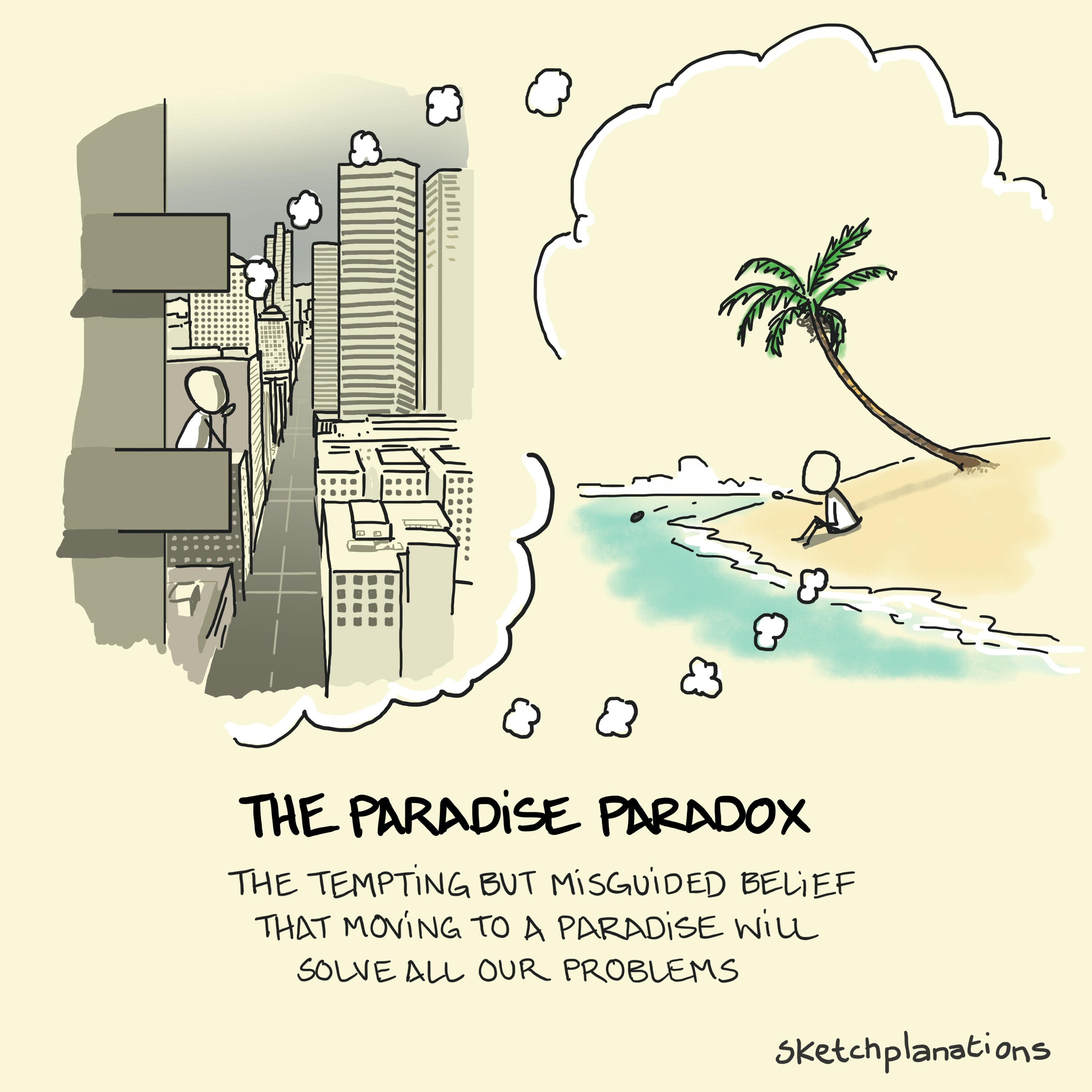The paradise paradox

👇 Get new sketches each week
The Paradise Paradox is the tempting but misguided belief that moving to a "paradise" will magically make everything better. It's the idea that a change of scene to somewhere beautiful or exciting will somehow sweep away all our problems. And while a fresh setting can give us a lift, the reality is often more complicated: paradise, as wonderful as it might be, won't always solve the everyday challenges we bring along with us.
Idealizing Paradise
Moving to your paradise might feel incredible, and it's a life-changer for some people, but it's easy to idealize paradise, imagining it as a place where worries simply disappear. Yet even the most stunning places could start to feel ordinary, and your conceptualised paradise may have its own challenges.
For instance, perhaps your paradise is a beautiful, distant, exotic land. Such a paradise, however, has the drawback of no longer being distant or exotic once you arrive and the day-to-day takes over. Someone living in a fast-paced metropolis might dream of calm and quiet, while someone surrounded by calm and quiet may dream of the rush and excitement of the big city.
Alastair Humphreys, who introduced me to the Paradise Paradox in his book Local , gave a great example in our podcast about Microadventures . In an interview on an American podcast, the interviewers couldn't imagine exploring Kansas to be exciting—it was known or even home to them. But to Alastair, a visit to Kansas would be an adventure, full of new things to see and do. It's a reminder that our ideas of paradise are often fueled by novelty—and novelty, by nature, doesn't last forever.
Expectations, the day-to-day, and Adaptability
Some of the Paradise Paradox may be explained by how easy it is to build up expectations. If we imagine paradise as the ultimate fix, it could lead to disappointment if it doesn't live up to the dream. As for vorfreude—the joy of anticipation—the build-up can sometimes overshadow the reality.
Then there's the simple truth that day-to-day life in paradise isn't a vacation. A tropical beach holiday lets you unwind and enjoy the scenery without a care. But living there might mean dealing with rainy seasons, work deadlines, or just regular old laundry.
Humans are also remarkably adaptable. We're good at adjusting to new surroundings, which means something initially remarkable may soon become the new normal. It's a bit like the grass-is-greener mentality we see in many areas of life. If you're a consultant, you might long for the stability of an in-house role, while in-house folks might crave the variety of consulting.
The Dark Side of the Paradise Paradox
In some cases, the Paradise Paradox takes on a more serious tone. The documentary film The Paradise Paradox , executive produced by Olympic ski racer Bode Miller and filmmaker Brett Rapkin, explores how people drawn to the beauty and tranquility of US mountain towns sometimes face mental health struggles. These picturesque communities, though visually idyllic, have experienced higher-than-average rates of suicide, highlighting the challenges of living in remote, isolated settings.
Strategies to Minimize the Pull of the Paradise Paradox
To reduce the effect of the Paradise Paradox, it helps to focus on what brings fulfillment in any setting, allowing us to appreciate where we are without feeling the constant pull of an imagined paradise. Here are a few ways to lessen the allure:
1. Cultivating Gratitude
Practicing gratitude allows us to recognize the value of what we already have. Focusing on the positives around us may make us less inclined to search elsewhere for happiness, realizing that contentment often lies closer than we think.
2. Prioritizing Experiences Over Material Goods
Research consistently shows that experiences bring longer-lasting happiness than possessions. Prioritizing meaningful activities and memories can bring joy and satisfaction, outlasting the initial thrill of accumulating more.
3. Simplifying Life
A minimalist approach can help reduce the constant desire for more—whether it's things, places, or achievements. Simplifying our lives can allow us to focus on what truly matters and bring a greater sense of peace.
4. Pursuing Meaningful Goals
Focusing on personal growth, nurturing relationships, and contributing to our communities can offer a lasting sense of fulfillment that doesn't depend on our surroundings. Meaningful goals and connections often provide the depth of happiness that location alone can't bring.
Paradise can certainly refresh us, but true and lasting happiness is often about embracing where we already are and what we already have.
Since writing this I keep seeing related quotes:
The only Zen you can find on the tops of mountains is the Zen you bring up there.
— Robert M. Pirsig (via Waking Up )
“We tend to attribute happiness to our circumstances (what happens to us) but studies suggest our happiness is really dependent on what we pay attention to.”
— Cal Newport, Deep Work (via Mind Over Tech )
"Happiness isn't getting what you want, it's wanting what you got."
— Garth Brooks
Wherever you go, there you are.
Also see:

